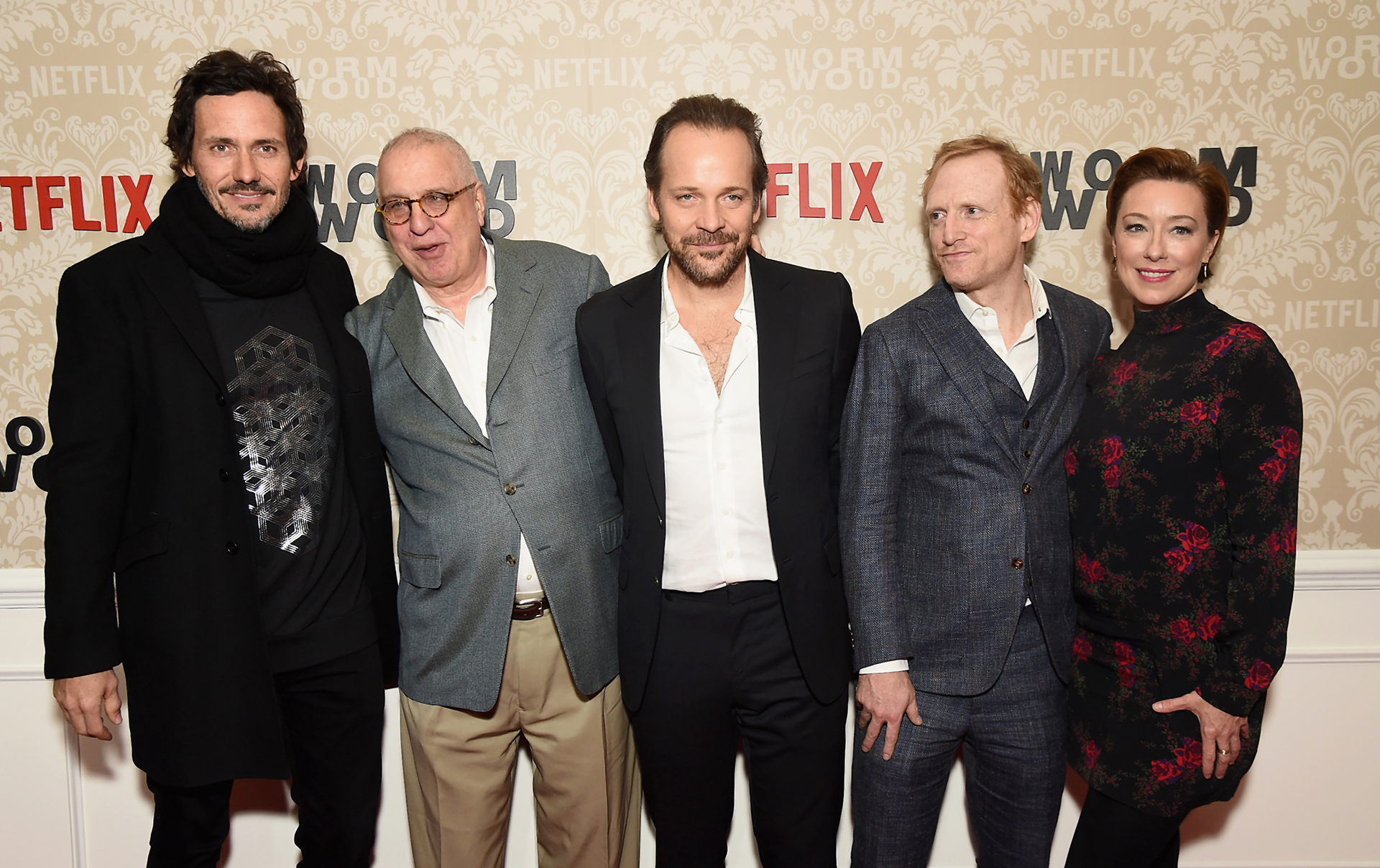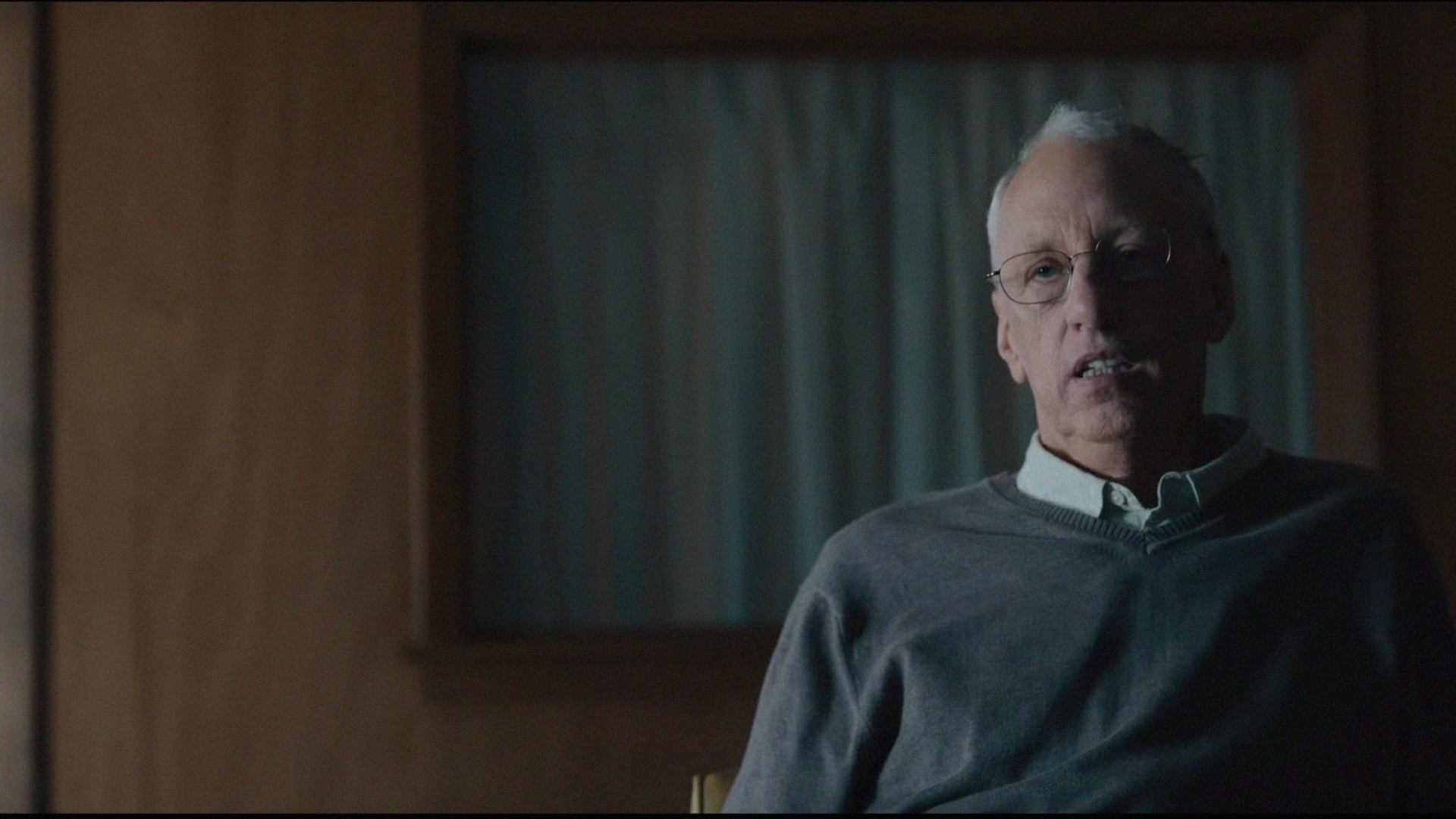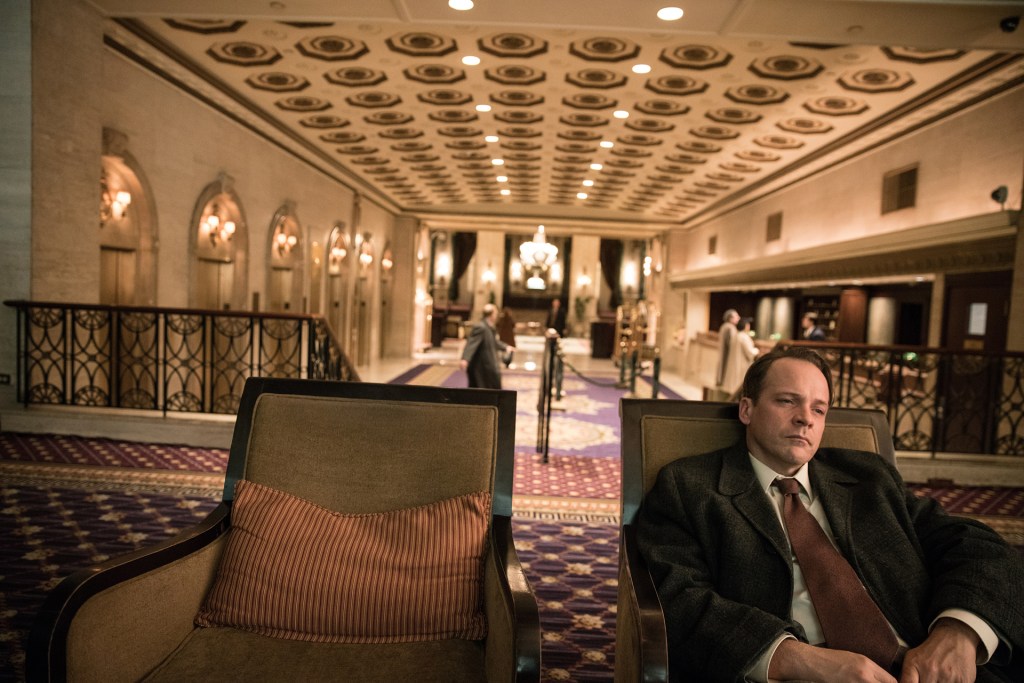Director Errol Morris is just a “different” kind of filmmaker. The kind of different that breaks thematic rules with genre-blending docs like A Thin Blue Line (1988). The kind of different that conceives entire new ways of interviewing subjects via something called an Interrotron method; and the kind of different that will say odd things like,“When I was first going out with my wife, I told her that while I was interviewing a serial killer, I was still thinking of her.” Yes, Morris told me that in a phone conversation, and yes, he’s that brand of romantic.
It’s what he’s always done, and it’s what he’s continuing to do in his latest murky and mysterious docu-series Wormwood on Netflix. Part drama, part documentary, Errol has taken on the story involving the 1953 suicide of Frank Olson—a CIA operative who had little reason to off himself. It’s a dramatization that twists, rotates, and examines the particulars surrounding his death through the eyes of his still living son, Eric Olson. Eric has long suspected that some bullshit was at foot involving some CIA goons, some LSD, leading to something that was less suicidal and more murderish. And through the lead roles of Molly Parker, Christian Camargo, and Peter Sarsgaard, Morris seems to have created something that’s as much fiction as it is fact.
Videos by VICE
In a phone conversation with all three actors and Morris, I took a little time dissecting the appeal of this conspiracy theory and why everyone involved believe it to be such a beautiful time to start questioning the government again.

VICE: I want to get at the particular attraction for you guys involving Eric’s story and his father. Conspiracy theories as a whole are a dime a dozen.
Errol Morris: Are they really?
Well yeah, type in conspiracy theory in any search engine.
Peter Sarsgaard: Well not so in the governments using LSD sort of way.
True. I guess I want you guys to elaborate on that specific thing about this story that seemed so uniquely intriguing.
Morris: Well the story, the CSI mind controlling program, Project MKUltra in general, conspiracy theorists eat that up. I’m sorry, I’m not a conspiracy theorist, although, clearly, there have been many conspiracies that have gone on in my past and around me. My usual line is that people are far too much at cross purposes with each other. Formulatively stupid, and in a group, can usually conspire to do and believe anything. Although I have to say, I did conspire with these guys to make Wormwood. We’ve only been able to keep it a secret for so long. The guess the cat’s out of the bag.
Sarsgaard: The attraction for me to be honest, was around shining a light on a quote on quote conspiracy theory in real life that would lead to the fact that there’s no conspiracy theory at all. That we’re actually looking for the truth and following a son’s quest who’s attempting to find out what happened to his father. It actually becomes much more interesting to partake in that, and play characters, who in my case, sorta disappeared. He doesn’t really exist except from a single picture and signature. This stuff happened in our own backyard. This wasn’t Russia, or China, this happened in America just a few years ago. This had its hands in Korea, Russia, Donald Rumsfeld, and people who are actually present in today’s society with issues that also remain present today. All that was a huge lure, and I intended to support Errol, but instead, he gave me a part himself.
Morris: Lucky me.
The story isn’t what I expected. It’s not just about this larger conspiracy, it’s also about this guy Eric and his obsession. How did your thoughts of him change over the course of the project?
Morris: It’s a question I don’t know if I’m willing to answer. (laughs)
Sarsgaard: Right, yes, don’t answer that question. I’ll personally say this, I didn’t communicate with him very much. And mainly because for an actor, something like this, getting to try to understand who this guy was on some sort of deep level by speaking to Eric for example is tough. I mean, I’ve played a number of characters based on real life people, and I always find, strangely, that to speak to the people that had the closest relationships with the person can provide its own confusion. Everybody has a strong agenda for the people they once knew. So for me, I thought of my own parents.
My own father. A person who was very much a product of the 50s. But the way my dad even talks about the government now, even after Watergate, and Project MKUltra, the Pentagon Papers and the rest, is with some expectation that it is a place that tries to tell you the truth, but messes up every once in awhile. My experience paints it as a place that operates us to get us to believe and think what they want us to believe and think. So it’s all very much like this expectation level in mind for people like my father who was a military man himself. He just wanted to give what he could to his country as a mathematician. It’s an idealism that I no longer think exists today, and is very much a product of that time.
I imagine there’s a balance between what’s compelling and something that’s more akin to a reenactment. What freedoms did you guys have?
Morris: I don’t know very much about acting at all. I imagine what it must be like to be an actor. That’s why the term reenactment for example, is such a strange term. For an actor to actually embody this kind of role, they have to find it, not in comparison to the world outside themselves, but they have to rather find it inside of themselves. And I believe that each and every one of these guys did just that, and the result is that these roles are very, very powerful and moving.
I tell everyone, never give actors directions before you see what they’re about to do, because you may have destroyed everything. Say nothing, wait for them to do what they do, and if it’s good, it’s done. You don’t have to do anymore, they’ve done all the heavy lifting for you, so just shut up. And that as true time and again. Christian in particular amazed me time and again with his performances. I could never have directed that, come on! It’s just not possible. A kind of wealth of subtlety, ambiguity, and confusion. Christian does confusion and moral ambiguity better than anybody.
Christian Camargo: It confuses me all the time. It confused me for 20 years. (laughs)
Molly Parker: Some of us feel like acting is like cooking…OK wait, I’ve actually never expressed this before.
Morris: You mean like a recipe?
Parker: Well you put things in…OK, I’m going to start again, I’m just gonna let that metaphor go. (laughs). But what I wanted to say is, what comes out, usually isn’t what I had planned on coming out. My performances often come as a surprise to me. So what was quite enjoyable doing this project is that we had this script, these scenes, and this story with these characters, and then there was the archival information about these people. And there was everything that Errol knew and shared, and then there was the everything that Errol knew and didn’t share, you sort of take all of those things in. When I first sat with him, I had questions about this character, and we had a really nice dinner, and after I left, I thought, he didn’t even answer any of my questions (laughs). He’s so tricky. But I still came away with knowing how to play her. That’s the alchemy of what I love about doing this job. You can’t re-create it, that isn’t possible. You just put in all the things you’ve given, and something comes out on the other end. Oh my god…that’s so bad.
Sarsgaard: That sounds like a shitting metaphor now.
Parker: (laughs) god.
Camargo: That’s what’s so unique about combining the documentary format and the narrative fiction format. It’s all serving the greater good, which is the theme of finding the truth. I only call Errol a genius because I don’t think Errol knows that he’s one. He’s using all the nuance that we ascribe to fiction into a search for the truth, and relating it to an actual event that happened. Combining those two forms is amazing. No one has ever done it like this.
Sarsgaard: Honestly, he’s the most charming guy that I know that knows as many serial killers past and present. It’s amazing with this guy. He’s known a lot of people like that, yet he has a natural buoyancy when you talk and meet him.
Morris: When I was first going out with my wife, I told her that while I was talking to a serial killer, I was thinking of you. (laughs)
Parker: That’s really sweet

Given the state of the US government right now, how do you guys place the importance of stories like this at this particular time.
Christian: It’s incredibly important. It’s vital and crucial. The whole Eric Olson story as seen through Eric…makes you question just how crazy Eric must be for speaking the truth as much as he does. But without speaking for that truth, we come complacent as many Americans have become I believe.
Sarsgaard: And look how misinformation destroyed people’s lives.
Christian: Exactly. We have to be committed to finding the truth, it’s the only way we’re going to effect change, is finding out, for ourselves, the truth. If we’re going to believe all of this stuff including the media, we have to go through our own fact finding mission. And that’s what Eric is doing. We need that now more than ever in this country.
Morris: We need to just start thinking. One wonders how things have become this bleak in America.
Camargo: Yeah, I blame Canada.
Morris: Here’s a question for you, we would love an answer. Is Canada truly responsible for everything that has gone wrong in the world?
Yes, yes we are.
Catch Wormwood when it debuts December 15th on Netflix.
Follow Noel Ransome on Twitter.




